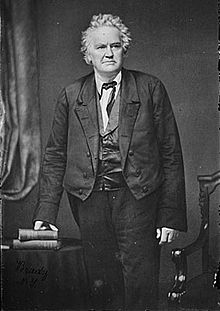Joshua Reed Giddings
He was censured in 1842 for violating the gag rule against discussing slavery in the House of Representatives when he proposed a number of Resolutions against federal support for the coastwise slave trade, in relation to the Creole case.Joshua Reed Giddings was born in Bradford County, Pennsylvania at Tioga Point, now Athens, on October 6, 1795.[2]: xiv In 1806 his parents Elizabeth (née Pease) and Joshua Giddings moved the family to Ashtabula County, Ohio, which was then sparsely settled.[3] Here they settled on Ohio's Western Reserve, which "provided him with the occupational and social mobility so characteristic of the early nineteenth-century frontier",[2]: xiv where Giddings lived for most of the rest of his life.[2]: xiv One of their children, Grotius Reed Giddings (1834–1867), was Major of the 14th United States Infantry in the American Civil War.For the start of the 1841 session Giddings and some of his colleagues, Seth M. Gates of New York, William Slade of Vermont, Sherlock J. Andrews of Ohio, and others, constituted themselves a Select Committee on Slavery, devoted to driving that institution to extinction by any parliamentary and political means, legitimate or otherwise.The expenses included the board and keep of Theodore Dwight Weld, the prominent Abolitionist lecturer, who researched and helped prepare the speeches by which the members excited public opinion against slavery at every opportunity.Their headquarters was in Mrs. Sprigg's boarding-house, directly in front of the Capitol, where Gates, Slade, Giddings, Weld, and the influential abolitionist minister Joshua Leavitt, lived during sessions of Congress; others gradually joined them.[3] His statements in the Creole case attracted particular attention, as he had violated the House's gag rule barring antislavery petitions.[7] Daniel Webster, then U.S. Secretary of State under President John Tyler, asserted that as the slaves were on an American ship, they were under the jurisdiction of the U.S., and by U.S. law they were property.He asserted that in resuming their natural rights of personal liberty, the slaves violated no law of the U.S.[8] He contended the U.S. should not try to recover them, as it should not take the part of a state.The House abandoned any thought of disciplining Giddings, and his colleagues on the Select Committee on Slavery discovered that his impunity extended to them.Giddings' daughter Lura Maria, an active Garrisonian, convinced her father to attend the meetings held by Garrison's followers, which heightened his anti-slavery position.

Mathew BradyDean of the United States House of RepresentativesLinn BoydJohn S. PhelpsU.S. House of RepresentativesJohn Hutchins16th district20th districtElisha WhittleseyOhio House of RepresentativesTioga PointPennsylvaniaMontrealCanadaDemocratic-RepublicanFree SoilOppositionRepublicanabolitionistWhig Partycensuredgag rule against discussing slavery in the House of Representativescoastwise slave tradeCreole caseWestern ReserveCivil WarBradford County, PennsylvaniaAthensCanandaigua, New YorkAshtabula County, OhiofrontiermilitiaWar of 1812American Indianschoolteacherland speculationadmitted to the barBenjamin WadeU.S. SenatorTheodore WeldAndrew Johnson administrationimpeachmentPanic of 1837United States House of RepresentativesOhio's 16th districtOhio's 20th districtFree-soilerOpposition PartySeth M. GatesWilliam SladeSherlock J. AndrewsTheodore Dwight WeldJoshua LeavittJohn Quincy AdamsSeminole WarNassau, Bahamasslavery in the District of ColumbiaCongressgag ruleDaniel WebsterU.S. Secretary of StateJohn TylerjurisdictionpropertyGarrisonianWilliam Lloyd Garrisonnatural lawcaning ofCharles SumnerAmerican InfidelityinsurrectionFugitive Slave Act of 1850annexation of TexasMexican WarCompromise of 1850Kansas–Nebraska ActZachary TaylorFree Soil PartyRepublican partyJohn C. FrémontAbraham Lincolnanti-slavery movementUnderground RailroadRichmondconsul generalJefferson, OhioHis law officeNational Historic LandmarkCuyahoga County Soldiers' and Sailors' MonumentIndiana State LibraryJoshua R. Giddings Law OfficeList of United States representatives expelled, censured, or reprimandedOhio General AssemblyBrooklyn Times-Unionpublic domainChisholm, HughEncyclopædia BritannicaJulian, George WashingtonGilman, D. C.New International EncyclopediaProject GutenbergLibriVoxInternet ArchiveBiographical Directory of the United States CongressAppletons' Cyclopædia of American BiographyFind a GraveOhio's 16th congressional districtJames MathewsOhio's 20th congressional districtWhittleseyMathewsCumminsHoaglandJohnsonTompkinsCutlerBinghamDanfordMcKinleyUpdegraffTaylorWilkinsGeddesWarwickOhligerPearson